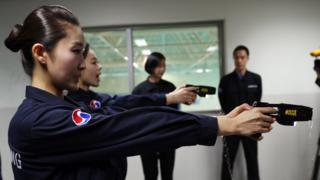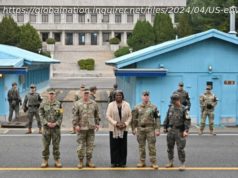 South Korea’s national airline has used electric stun guns on five passengers during flights, the BBC has learned.
South Korea’s national airline has used electric stun guns on five passengers during flights, the BBC has learned.
Korean Air is believed to be the only major carrier to routinely have the weapons on board.
The airline is ramping up training for staff using the guns after criticism for the way it handled a recent in-flight disturbance.
In that incident, US singer Richard Marx was among passengers who helped restrain an unruly passenger.
Afterwards, both Mr Marx and his wife Daisy Fuentes used social media to claim that the crew was “ill-trained”.
Ms Fuentes wrote on Instagram: “They didn’t know how to use the Taser and didn’t know how to secure the rope” around the passenger.
Taser is a brand name of a electric stun gun. The reference surprised many who did not expect airlines to carry the weapons, which are more commonly used by police.
The carrier told the BBC it first introduced electric stun guns in 2002.
It now carries at least one set of weapons on every plane, with two sets on its A380 jumbo jets.
A Korean Air spokesman said that of the five incidents, three involved the gun being fired.
In those instances, the gun used compressed air to fire darts that release a 50,000-volt electric charge, designed to temporarily paralyse the target.
In the two other cases, the weapon was used as a stun gun, with the electric current fired directly into the passenger, with the weapon held against them at close range.
Korean Air would not give further details about what prompted each incident, when they occurred or what happened to the passengers.
But it confirmed all took place while the aircraft were airborne.
After the incident involving Mr Marx, the airline said it was training its crews to use the weapons more “readily” against violent passengers.
It also invited media to see a session where crew were practising using Tasers.
Korean Air’s former president, Chi Chang-hoon, said Asian airlines had not followed US carriers in tackling on-board violence and suggested “Asian culture” was to blame.
However, the airline’s spokesman said that current protocol limited cabin crews to using tasers “only during life threatening situation or when the safety of an aircraft is threatened”.
The International Air Transport Association (IATA) said airlines were not required to inform them if they carried the weapons on board.
Several major carriers contacted by the BBC declined to comment on whether or not they had Tasers on board, citing security concerns.
But some large airlines including Etihad, Malaysia Airlines and India’s Jet Airways confirmed they did not carry electric stun guns.
And sources at other global carriers, including Emirates and Lufthansa, also said they were not part of standard on-board kit, although the airlines did not officially confirm this.
However, most airlines do carry equipment to restrain disruptive passengers including ropes, cuffs and adhesive tape.
There is some risk to using Tasers or other similar stun guns, although this tends to revolve around the harm to those hit by them.
In the UK, there have been at least 17 deaths linked to the use of stun guns since they were introduced by police in 2003.
And while not ideal to use one on a plane, there is not thought to be any great risk to the safety of a plane if a Taser was activated.
Bear in mind that proponents of air marshals (see below) argue that even when using regular gunfire on a flight – the level of risk is manageable.
Unruly behaviour on aircraft is a growing problem according to a study by IATA, with a sharp rise of incidents in 2015.
Incidents of people getting in fights, being verbally abusive or refusing to follow cabin crew orders were up by 17%.
Alcohol or drug use was identified as a factor in one-in-four incidents.
In 11% of cases, there was physical aggression or even damage to the aircraft.
Some 10,854 incidents of passengers disrupting flights were reported to IATA last year, up from 9,316 incidents in 2014. That’s one incident for every 1,205 flights.
An air marshal is an undercover armed guard on board a commercial aircraft, to counter hijackings and other hostile acts.
In the event of an imminent threat from a passenger, air marshals say they are trained to respond with lethal force.
Their use was ramped up, especially in the US, after the 11 September 2001 attacks.
It is thought there are now several thousand marshals employed by the US Department for Homeland Security, compared with the 33 flying regularly pre-9/11.
Israel’s El Al has had armed marshals operating on its flights for more than 30 years.
IATA says that – perhaps not surprisingly – countries which do employ air marshals, do not disclose which flights they are on.






